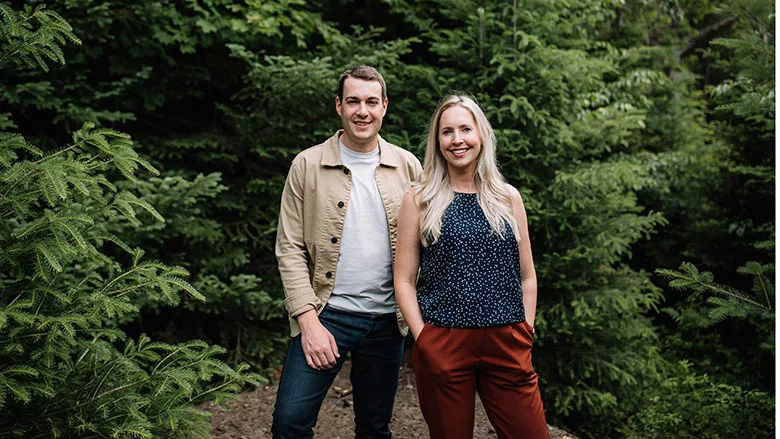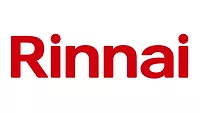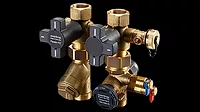PM Profile: Canadian company brings first-ever recirculating shower to U.S. market
RainStick Shower can save 80% water and energy with twice the flowrate of a common shower.

RainStick founders Alisha and Sean McFetridge. Images courtesy of RainStick Shower.
Sustainability and water conservation were two of the main trends seen at the 2023 Kitchen and Bath Industry Show in Las Vegas earlier this year. One Canadian-based company is tackling water efficiency starting with the top water-guzzling appliance in the home — the shower.
RainStick Shower co-founders Alisha McFetridge and Sean McFetridge share a longtime passion for water conservation. In 2019, the two began building the North American Market’s first water circulating shower. Supply House Times Chief Editor Natalie Forster sat down with Alisha McFetridge to dive into RainStick Shower’s backstory and plans for the future.
PM: WHY SHOULD HOMEOWNERS AND HOME BUILDERS BE CONSCIOUS OF SHOWER WATER CONSUMPTION IN THE HOME?
AM: When it comes to water conservation, there are significant problems in the home today. About 100 liters - or 25 gallons - of water is utilized during a 10 minute shower. To put that into perspective, it’s is about 250 water bottles, just during a 10 minute shower. Showering accounts for approximately one-third of water bills and one third of energy bills for most homeowners.
Homeowners should care because not only is it costing a lot of money over the life of the shower, but it's water intensive, and we're seeing scarcity across the U.S. right now.
We've had the same showering appliance since the 1800s — that's why the idea for RainStick Shower developed. To date we haven't seen much innovation to save water in the shower. There are a lot of problems and it's time we take this seriously and do so much more.
PM: WHERE DID YOUR PASSION FOR CONSERVATION AND WATER SCARCITY COME FROM?
AM: RainStick started in Canada's only desert — the Okanagan Valley. A lot of people don't realize that Canada has a desert. You can speak with Canadians who don't realize there is a desert.
RainStick's founding team - Sean and myself - are both from this area. We both have business background. I went into water conservation early on in my career and Sean went into energy conservation. I think that's what makes RainStick unique; we each bring these niches that layer and compliment each other.
Sean used to be a lifeguard at a city water park. He would watch the water at the park circulate over and over, and he always thought to himself, 'why can't we be doing more of this within the home?' So, when we got together, we knew that we wanted to build water technology to address the water waste in the home.
Our foundational thought with water conservation is that the best water you save is the water you never use in the first place. We used our passion for saving water and energy to develop an extremely efficient, point of use answer to this problem - RainStick Shower.
 A traditional 10-minute shower uses 100 litres (26 gallons) of water. RainStick uses less than 20 litres (5 gallons) while doubling your water flow.
A traditional 10-minute shower uses 100 litres (26 gallons) of water. RainStick uses less than 20 litres (5 gallons) while doubling your water flow.
PM: WHAT IS THE GO TO MARKET STRATEGY?
AM: Right now it's all about keeping up with demand. We are seeing a lot of interest within the West Coast of the U.S. We will be in showrooms, working with manufacturers reps and with wholesaler-distributors in the future. We are actively seeking out new manufacturer reps to partner with.
PM: WHAT'S BEEN THE CONSUMER RESPONSE SO FAR?
AM: We started attending some trade shows last year with our prototype. We wanted to understand what people thought about the technology. We've received positive responses so far. Last year we won Studio North's Best Collection Award during the 2022 Toronto Interior Design Show. We also won the Best of KBIS 2022 Impact Award and the KBIS Kickstarter Award last year.
A lot of people, specifically designers and architects, are excited about this technology because it's such a substantial way to save both energy and water. And it's something that is truly innovative that they can bring to projects that are looking for more sustainable technology.
Most people have never seen a circulating shower, so they want to know more and understand the technology. RainStick is North America's first circulating shower, so we've certainly had to provide education and talk people through what it is and how it works.
We're having conversations with water commissions now that are interested in offering subsidies for RainStick installation. There's a lot of interest right now and we're definitely going to see it grow in years to come.
PM: WITH NEW TECHNOLOGY COMES HESITATION. WHAT ARE SOME HESITATIONS OR CUSTOMER QUESTIONS THAT YOU OFTEN HAVE TO CLARIFY?
AM: With a product offering up to 80% energy savings, but at the same time providing almost double the flow rate of a normal shower - 3gpm, people don't understand how it’s possible. So we have to explain the logistics: There's a pump in the system that allows us to achieve that flow rate. People also want to know about the quality of the water and they want to understand how it’s not greywater.
We’re selling to the innovators and the green-minded specifiers who are looking for more sustainable technology for their projects. In places where regulation is drilling down, people can't build the type of waterfall showers that are popular now. Cities are cracking down and saying no. So alternatively, they're using RainStick.
 RainStick has won interior design awards and is gaining traction in the showroom space.
RainStick has won interior design awards and is gaining traction in the showroom space.
PM: DO YOU SEE THE POTENTIAL FOR THIS SORT OF RECIRCULATION TECHNOLOGY TO COME TO OTHER PARTS OF THE HOME?
AM: We saw this huge opportunity specifically for showering at the beginning, because it doesn't just use water, but also energy to heat the water. The energy pay back potential is large. In California, it's a five year payback period if you install RainStick Shower.
Now, we're starting to question what happens with that 20% of water that goes down the drain? What are we doing with it? Is there a way that we can also save that water? The bottom line is that we can be a lot more efficient with some other technologies in the home. For example: Why are we using perfectly clean water every time we flush the toilet? Why are we using so much water when we flush the toilet?
The top two most water consuming appliances in the home are the shower and the toilet, followed by laundry. Addressing showering is just the beginning.
PM: WHAT APPLICATIONS IS RAINSTICK BEST USED FOR?
AM: So far it’s been a 100% residential with our early stage installations. We're doing our first Boutique Hotel at the end of this year which is really exciting for us. Beyond that, we're in conversations with people about what this would look like in the RV space.
We're certainly trying to stretch RainStick’s product capability, because there are many other avenues where we're using too much water and energy. RainStick Shower is primarily residential right now but in the future we do see opportunity in the RV and hospitality spaces.
Looking for a reprint of this article?
From high-res PDFs to custom plaques, order your copy today!







